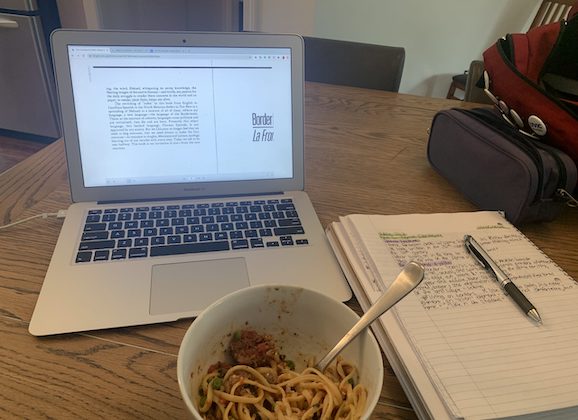6 things I wish I’d known about Academic Advising

That’s me on the left.
Welcome to your new UVic year! Congratulations on making it this far!
I know it has not been easy. For me, leaving my family in the Dominican Republic, my friends, the food and my culture overall were not easy tasks. I told myself that I was going on a new adventure, one that I would be grateful for in the future. So here I was, just like many of you on your first days of classes and orientation. While I was mesmerized by my new campus, I was stuck.
In my first year I had a few problems (besides the usual culture shock and English language barriers). I did not have some pre-requisites for my courses, I needed departmental permission for other courses and forgot to register for some of my second term courses.
I was able to solve these issues, though. I had several meetings with people from the chemistry, biology, physics, math and English departments. My professors and other staff were able to help me organize my courses but it all seemed very hard and complicated! How could so many other science students get their courses and degrees organized?
Well… not everyone does. Most of us do not.
That was four years ago, though. I just started my fifth and final year. I can confidently say that I have my degree under control.
Thanks to an academic adviser and a lot of help from my friends, all of my questions related to “who, what, when” were answered!

Starting first year like…
So how can other students do it? I want to share a few tips I have learned along the way and hopefully make your journey more enjoyable 🙂
1. Use the Program Planning Worksheets.
 Program planning worksheets are literally The. Most. Helpful. online guides that I have used for my degree planning. I only came across them quite recently yet they’re still very helpful when it comes to enrolling in any courses I’m missing to graduate or simply to help my friends plan their courses.
Program planning worksheets are literally The. Most. Helpful. online guides that I have used for my degree planning. I only came across them quite recently yet they’re still very helpful when it comes to enrolling in any courses I’m missing to graduate or simply to help my friends plan their courses.
I click on the link to my program (Biology) and do a quick check between the courses I have taken, the ones I will take and the ones I am missing to graduate.
Why do I love this? The worksheets are available 24/7 for most programs and I don’t have to rely on someone else to help me figure out what I need. I find that they work well for most students but when you try to add certificates, minors, etc. it is best to talk to an adviser.
2. Meet with an Academic Adviser.
 Meeting an academic adviser gives you control over your degree. University degrees can sometimes be very flexible; some allow for minors, certificates or even honours. If you are like me and like to try everything, talking to an adviser will definitely help you save time, money and stress.
Meeting an academic adviser gives you control over your degree. University degrees can sometimes be very flexible; some allow for minors, certificates or even honours. If you are like me and like to try everything, talking to an adviser will definitely help you save time, money and stress.
When I was planning my degree I assumed I had to take four extra courses to complete a certificate in French. I did not imagine some of the courses in my certificate would count towards my Biology degree as electives. I am saving around $5000 CAD thanks to an adviser (and we met for around 15 minutes — very cost effective).
Furthermore, if you are also struggling like I did at the start of my first year, then why not ask for help? In a different scenario I could have talked to an adviser to figure out what was I was missing in order to complete my degree requirements or to find out who was the right person to talk to.
Honestly, I was convinced that I did not need the help of an adviser, but now I know they can be a great help with simpler or more complicated tasks. Even now, I find that navigating the UVic website can be confusing, so I take 15 minutes of my morning to arrive at the advising centre early, ask questions or make an appointment whenever I am not sure about something regarding my degree completion.
3. Check the updated online undergraduate academic calendar.
 Through the calendar you can find which courses are currently offered at UVic (or that might be offered in the future). For my Biology degree there is a set number of elective courses that I need to take to graduate.
Through the calendar you can find which courses are currently offered at UVic (or that might be offered in the future). For my Biology degree there is a set number of elective courses that I need to take to graduate.
This is one of my favourite sections because it opens my mind to the different fields of study at UVic and because I am eligible to take several courses that are not in my own field. Just make sure you have all of the prerequisites (e.g.”being a third year student”) or contact the department before you try to enroll in a course.
4. Talk to your professor
I figured this one out in first year. Your professors can give you a lot of advice, especially about other courses in their department. Some professors even work as advisers specifically for first year students. Most importantly, they are also human beings who have dedicated their time to teaching and helping students learn. They want to see us succeed.
5. Find support from your community
If you ever had to complete lab reports, projects, study for midterms, plus maintain a healthy balance, then you know it is hard.
University is hard but the community makes it so much better. By community I mean your residence peers, your friends and the people you see in class every day. We are all in the same sinking boat (joking)!
I do mean it, though, when I say we all need each other. We need each other to share our happiness, sadness, success and failures. Study groups are great as well and nothing beats movie nights after hard days of school. Cherish each other, this will all work out.
6. Trust your instincts
If something seems weird, it probably is! If you feel your course load is too heavy for you, it probably is as well. Advisers can help you plan your program to make sure you are in the right courses and can give suggestions if they see a potential for trouble. They can’t tell you if you will enjoy a course or not, though. Especially with electives, so trust your instincts. Choose what you love or even something new! Stay true to yourselves. You will succeed; now get back to work <3

Good luck everyone,
Enjoy your term!




